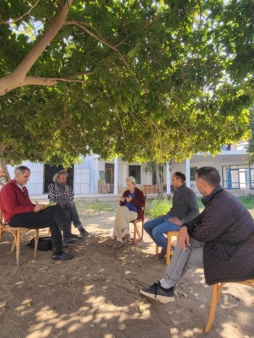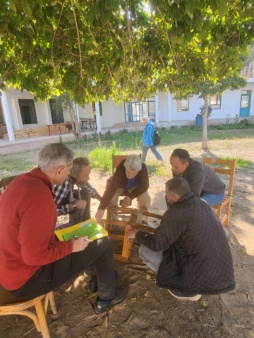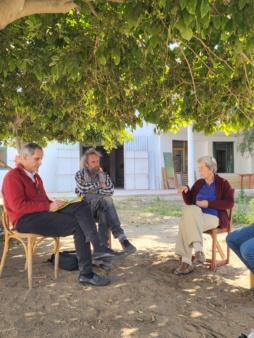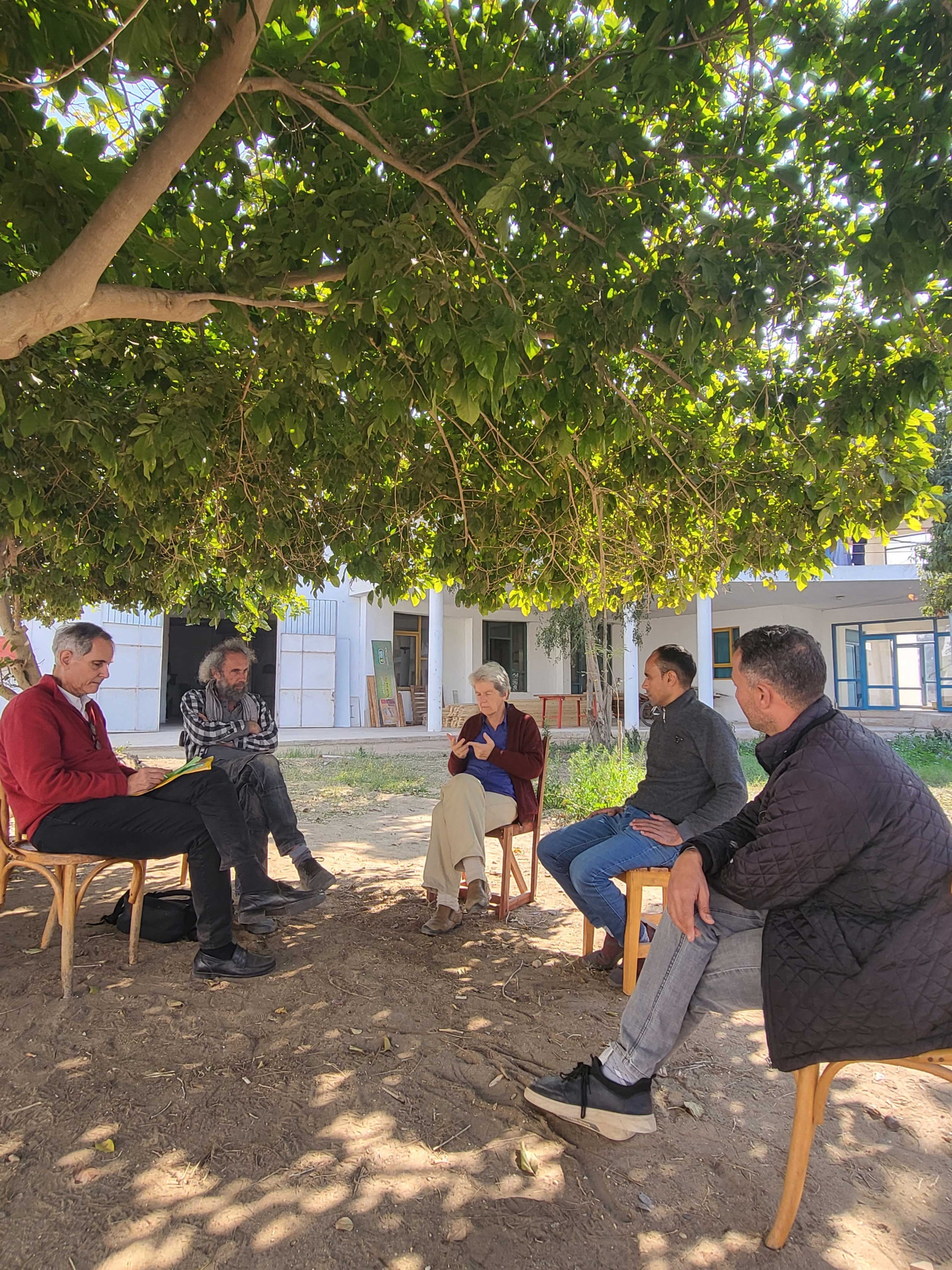

Conversation with the craftsmen Mohamed Saber and Ali Al-Sayed Ali
Mohamed Saber is a graduate of the carpentry training at SEKEM and has been the head of the training program since 2011. In recent years, he has mainly been involved in the production process. Ali Al-Sayed Ali joined later and is currently the main contact person for the trainees.
Fausi: During today’s visit, I noticed that only five trainees were present. Where were the other 15 students?
- Ali: Those were the five from the third year of the training program. The others had work outside.
Fausi: It looked like even these five did not have much work to do. Today they were spraying and debarking the logs at the wood yard. One student was spraying the logs, but the debarking was done by two employees. Do they not have a solid work plan?
- Mohamed: We are always under pressure because urgent orders constantly need to be completed. There is no time for a detailed weekly plan. In the best-case scenario we are able to follow a day-to-day plan.
Fausi: Today, a chair came back after its first use because it fell apart. It can be seen that the wood joints were not done properly. Such defects seem to have occurred less frequently in the past.
- Mohamed: This situation poses a challenge. Due to ongoing time constraints, production errors have regrettably occurred.
Fausi: The interviewed trainees expressed that they would like to have more practical experience and to be more involved in the design stage.
- Ali: We take into account the unique preferences and abilities of our students to a certain degree. For instance, if a student possesses a talent for design and drawing, they are encouraged to create their own piece of furniture. However, the parameters are defined by educational regulations, particularly during the final exam, where students are tasked with constructing a chair or table within a two-day time-frame based on a provided design. Ultimately, the completed furniture pieces are typically acquired by the government.
Fausi: Another request I heard from the trainees is excursions or internships in other wood processing companies, such as furniture factories.
- Mohamed: We have yet to arrange excursions or internships for our trainees at other wood processing companies. However, we have identified a furniture manufacturer that we are eager to visit once the opportunity arises. Transportation logistics have been a challenge in organizing such visits.

Conversation with Francis Corbat and Felix Auth
Francis Corbat is a Swiss carpenter who has been visiting SEKEM every one or two years since 2014. He brings extensive experience from Switzerland in operations management, furniture design, and the training of young people with psychological or social issues. He has also procured various new machines for the workshop, most recently a band saw. Felix Auth is a German carpenter who now lives permanently in Egypt and speaks Arabic fluently. He is responsible for the wood department at SEKEM and has taken important steps in recent years in both the construction and architecture sector and in training. For the desert farm in Al Wahat Al Bahariya, all wood products were manufactured and assembled by the SEKEM carpentry workshop. The desert farm is an example of sustainability not only in agriculture but also in the construction sector. All buildings there are constructed with wooden structures and rammed earth. The planned center of excellence at the SEKEM farm aims to provide high-level expertise in woodworking to people from the SEKEM community as well as outside.
Fausi: Francis, you were present at the meeting with the trainers of the carpentry workshop. What is your impression?
- Francis: It’s true that the circumstances are not easy and resources are limited. But that should not be an excuse. For example, the constant time restraints they’ve mentioned. This is partly self-inflicted. With clear weekly plans, one could better keep track and, if necessary, explain to a client why a task cannot be completed immediately. After all, training is a priority alongside the goods production.
Fausi: How can it happen that a poorly assembled chair leaves the workshop?
- Francis: Time restraints are certainly a factor. However, with poorly maintained machines, precise and efficient work is not possible, which leads to time loss. Machine maintenance needs to be significantly improved. This is also a matter of further education: daily work requires regular training. Without constant capacity building, the workers start losing focus and disinterest inevitably arises. And above all, goals need to be formulated more clearly, and clearer responsibilities need to be established.
Fausi: The trainees are mostly poorly equipped for daily work: they often do not wear protective gear such as sturdy shoes, ear protection, or safety glasses.
- Francis: That’s true. In Switzerland, personal equipment is the responsibility of the trainees. But here, the trainees and their families can not afford it.
- Felix: SEKEM has procured ear protectors and glasses for at least twelve people on two occasions. The problem is that they are often not worn and disappear over time. We need to create even more awareness for careful material management.
Fausi: Francis, what is your conclusion from your visit?
- Francis: After this visit, it has become evident that my ongoing efforts to enhance the operational structure are not yet yielding sustainable results. The machinery’s poor condition after a year, attributed to inadequate maintenance, and the workshop’s apparent lack of organization highlight the need for improvement. The recent deterioration of the new block bandsaw within a few months underscores the importance of better planning. It is crucial to establish a proactive maintenance schedule to prevent the need for catch-up work during subsequent visits, aligning with the overarching goal of maintaining efficient operations.
Fausi: Where do you see your role, and that of the other Swiss SEKEM supporters, in the future?
- Francis: I recognize the importance of increasing my presence and emphasizing strict adherence to guidelines. By planning to visit twice a year over the next few years and dedicating one to two months each time to collaborate with trainers and students, I believe we can establish a self-sustaining system. I am deeply appreciative of the support from Switzerland, particularly for funding materials and covering my travel expenses to Egypt. I want to express special gratitude to the Ramsay Foundation for their platform and assistance in our fundraising efforts.
Fausi: Felix, the planned center of excellence at the SEKEM Farm is intended to provide professionals outside SEKEM with knowledge in the woodcraft field. How do you see the role of the existing carpentry workshop in this initiative?
- Felix: Many graduates of the carpentry workshop have expressed the desire to continue their education after completing their training, which they can acquire in this future center. In order for them to be exemplary students, the quality of the basic training at SEKEM is very important. SEKEM supports efforts to ensure the high quality in the carpentry workshop.
Fausi: What is the concept of the center?
- Felix: It aims to offer advanced education comparable to the Austrian master craftsman or the higher technical school in Switzerland. Due to the focus on equipping graduates to sustain their expertise and apply their knowledge consistently, the one-year program will be structured into four modules, each spanning three months.
Fausi: Where do you get your teaching staff from?
- Felix: Some individuals originate from the SEKEM community, while a notable portion hails from external sources. A challenge arises due to extensive government involvement in the educational system. This is evident when we encounter difficulties in resisting the assignment of unsuitable teachers to our institution.
Fausi: What distinguishes the training at the center of excellence from that in the carpentry workshop?
- Felix: So far, we have had basic training that was combined with practice through hands-on experience in the workshop. The center of excellence offers advanced training for carpenters who are at various stages in their careers. It also covers topics that are not included in the basic training, such as cost accounting or project management. The new machinery will also expand the possibilities for skills development. In addition to custom-made products, series production will be added into the program.
- Francis: For example, the center could produce a large series of semi-finished products that are then further processed in small carpentry workshops.
Felix and Francis, thank you very much for the conversation! SEKEM is on the right track and I wish you all the best with your mission!
If you missed Part (1), click here
انقر هنا للوصول إلى الترجمة العربية للمقابلة.
Klicken Sie hier, um zur deutschen Version zu gelangen

